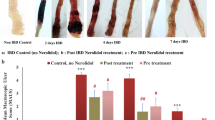Abstract
This study investigated the effects of purple rice extract (PRE ) on inflammation-related colon carcinogenesis. Administration of PRE 1 g/kg bodyweight reduced both the number (39.05%) and size of aberrant crypt foci (ACF) (14.28%) in the colons of rats that received dimethylhydrazine (DMH) initiation with promotion by dextran sulfate sodium (DSS) (P<0.05) with the reduction of TNF-α expression in colonic epithelial cells. On the other hand, PRE could suppress the expression of both TNF-α and IL-6 in RAW 264.7 cells activated by lipopolysaccharide (LPS) at both the mRNA and protein levels. Moreover it could reduce the expression of TNF-α and IL-1β mRNA in inflamed HT-29. These findings suggested that PRE is able to modulate the inflammatory process in both activated macrophages and colon cancer cells. Therefore, PRE suppressed macrophage activation and colon cancer cell line response to inflammation and modulated of inflammation induced ACF progression in the rat colon.
Similar content being viewed by others
References
Attasara, P. & Buasom, R. in Hospital-based cancer registry annual report 2012 (National Cancer Institute, Bangkok, 2014).
Klampfer, L. Cytokines, Inflammation and Colon Cancer. Curr Cancer Drug Targets 11:451–464 (2011).
Askling, J. et al. Family history as a risk factor for colorectal cancer in inflammatory bowel disease. Gastroenterology 120:1356–1362 (2001).
Colotta, F. et al. Cancer-related inflammation, the seventh hallmark of cancer: links to genetic instability. Carcinogenesis 30:1073–1081 (2009).
Burkholder, B. et al. Tumor-induced perturbations of cytokines and immune cell networks. BBA-Rev Cancer 1845:182–201 (2014).
Fearon, E. R. & Vogelstein, B. A genetic model for colorectal tumorigenesis. Cell 61:759–767 (1990).
Morin, P. J. et al. Activation of beta-catenin-Tcf signaling in colon cancer by mutations in beta-catenin or APC. Science 275:1787–1790 (1997).
Pan, M.-H., Lai, C.-S. & Ho, C.-T. Anti-inflammatory activity of natural dietary flavonoids. Food Funct 1:15–31 (2010).
Terzic, J., Grivennikov, S., Karin, E. & Karin, M. Inflammation and colon cancer. Gastroenterology 138: 2101–2114 (2010).
Mantovani, A., Allavena, P., Sica, A. & Balkwill, F. Cancer-related inflammation. Nature 454:436–444 (2008).
Raffoul, J. J., Kucuk, O., Sarkar, F. H. & Hillman, G. G. Dietary Agents in Cancer Chemoprevention and Treatment. J Oncol 2012:2 (2012).
Boonsit, P., Pongpiachan, P., Julsrigival, S. & Karladee, D. Gamma Oryzanol Content in Glutinous Purple Rice Landrace Varieties. Chiang Mai J Sci 9:151–157 (2010).
Punyatong, M., Pongpiachan, P., Karladee, D. & Mankhetkorn, S. Cytotoxicity of crude proanthocyanidin extract from purple glutinous rice bran (Oryza sativa L.) (Kum Doi Saket) compared with cyanidin 3-glucoside on X63 myeloma cancer cell lines. Nat Sci 42:676–681 (2008).
Apichai, S. et al. Evaluation of Antidiabetic Efficacy of Thai Purple Sticky Rice in High-Fat Diet plus Streptozotocin (STZ) Induced Type 2 Diabetic Rats. The 3 rd International Conference on International Relations and Development (ICIRD 2013), Chiang Mai, Thailand. August 8-10, 2013.
Summart, R. & Chewonarin, T. Purple rice extract supplemented diet reduces DMH-induced aberrant crypt foci in the rat colon by inhibition of bacterial beta-glucuronidase. Asian Pac J Cancer Prev 15:749–755 (2014).
Wongjaikam, S., Summart, R. & Chewonarin, T. Apoptosis Induction in Colon Cancer Cell Lines and Alteration of Aberrant Crypt Foci in Rat Colon by Purple Rice (Oryza sativa L. var. glutinosa) Extracts. Nutr Cancer 66:690–699 (2014).
Tu, J. et al. TanshinoneIIA ameliorates inflammatory microenvironment of colon cancer cells via repression of microRNA -155. Int Immunopharmacol 14:353–361 (2012).
Punvittayagul, C., Sringarm, K., Chaiyasut, C. & Wongpoomchai, R. Mutagenicity and antimutagenicity of hydrophilic and lipophilic extracts of Thai northern purple rice. Asian Pac J Cancer Prev 15:9517–9522 (2014).
Banjerdpongchai, R., Wudtiwai, B. & Sringarm, K. Cytotoxic and apoptotic-inducing effects of purple rice extracts and chemotherapeutic drugs on human cancer cell lines. Asian Pac J Cancer Prev 14:6541–6548 (2013).
Saenjum, C. et al. Antioxidant and anti-inflammatory activities of gamma-oryzanol rich extracts from Thai purple rice bran. J Med Plants Res 6:1070–1077 (2012).
Xu, Z., Hua, N. & Godber, J. S. Antioxidant Activity of Tocopherols, Tocotrienols, and γ-Oryzanol Components from Rice Bran against Cholesterol Oxidation Accelerated by 2,2'-Azobis(2-methylpropionamidine) Dihydrochloride. J Agr Food Chem 49:2077–2081 (2001).
Feregrino-Perez, A. A. et al. A non-digestible fraction of the common bean (Phaseolus vulgaris L.) induces cell cycle arrest and apoptosis during early carcinogenesis. Plant foods Hum Nutr 69:248–254 (2014).
Brown, W. A. et al. Non-steroidal anti-inflammatory drugs with different cyclooxygenase inhibitory profiles that prevent aberrant crypt foci formation but vary in acute gastrotoxicity in a rat model. J gastroenterol hepatology 15:1386–1392 (2000).
Puangpraphant, S. et al. Yerba mate tea and mate saponins prevented azoxymethane-induced inflammation of rat colon through suppression of NF-kappaB p65ser(311) signaling via IkappaB-alpha and GSK-3beta reduced phosphorylation. BioFactors 39:430–440 (2013).
Kohno, H. et al. Ursodeoxycholic Acid versus Sulfasalazine in Colitis-Related Colon Carcinogenesis in Mice. Clin Cancer Res 13:2519–2525 (2007).
Saxena, A. et al. Adiponectin deficiency: Role in chronic inflammation induced colon cancer. BBA-Mol Basis Dis 1822:527–536 (2012).
Lewis, C. E. & Pollard, J. W. Distinct role of macrophages in different tumor microenvironments. Cancer Res 66:605–612 (2006).
Kahkonen, M. P. et al. Antioxidant activity of plant extracts containing phenolic compounds. J Agric Food Chem 47:3954–3962 (1999).
Kumar, S. et al. Antioxidant and free radical scavenging potential of Citrullus colocynthis (L.) Schrad. methanolic fruit extract. Acta Pharm 58:215–220 (2008).
Bird, R. P. Role of aberrant crypt foci in understanding the pathogenesis of colon cancer. Cancer Lett 93:55–71 (1995).
Bird, R. P. Observation and quantification of aberrant crypts in the murine colon treated with a colon carcinogen: Preliminary findings. Cancer Lett 37:147–151 (1987).
Paul, S. et al. Anti-inflammatory action of pterostilbene is mediated through the p38 mitogen-activated protein kinase pathway in colon cancer cells. Cancer Prev Res 2:650–657 (2009).
Author information
Authors and Affiliations
Corresponding author
Rights and permissions
About this article
Cite this article
Phannasorn, W., Khanaree, C., Wongnoppavich, A. et al. The effect of purple rice (Oryza sativa L. indica) extract on the inflammatory response in a colon cancer cell line and dextran sulfate-induced tumor promotion in the rat colon. Mol. Cell. Toxicol. 13, 433–442 (2017). https://doi.org/10.1007/s13273-017-0047-0
Received:
Accepted:
Published:
Issue Date:
DOI: https://doi.org/10.1007/s13273-017-0047-0




